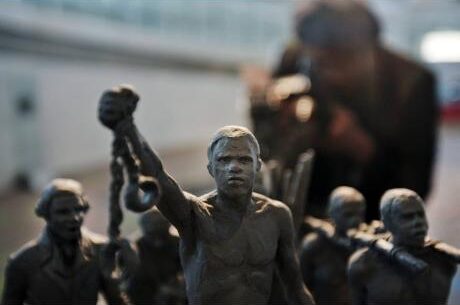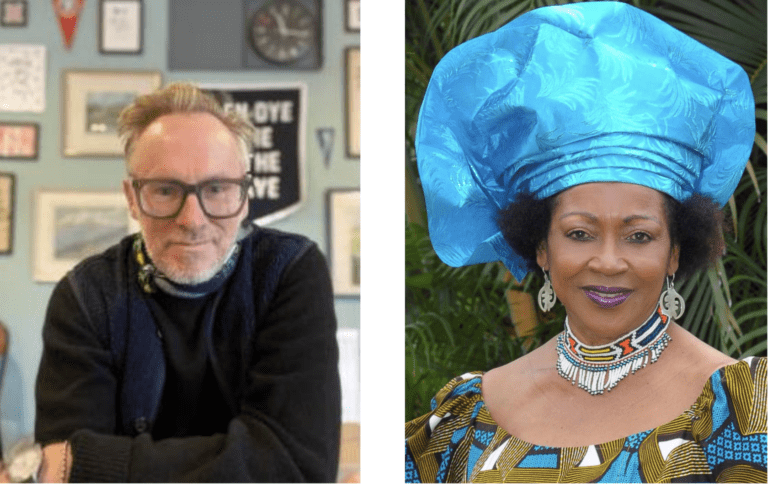Send feedback to [email protected]
Talking repair with Charles Gladstone – Part 2
The following article originally appeared in The Gleaner on October 8, 2023 as part of a series called “Reparation Conversations.”
You can read part 1 of the conversation here.
This is the second part of the interview with Charles Gladstone (CG), great, great grandson of the youngest child of enslaver John Gladstone, father of a 19th century British prime minister, William Gladstone, with Verene Shepherd (VS) about his ancestor’s role in chattel enslavement and Indian indentureship in Guyana and Jamaica, and his apology and planned actions.
VS: I want to return to the issue of Indian indentureship and reparation. While you were in Guyana, you faced protest from Indians. How did you feel about that?
CG: Yes, there were some protests. I believe in the right to protest and I believe that they were not protesting against me [specifically]; they were angry at history and the status quo. I only had the opportunity to talk to three of them, because some didn’t wish to speak either to me or to The Economist who was there covering our trip. To those to whom I spoke, I expressed that I profoundly believed they had every right to be angry with my sort.”
VS: So, you knew about John Gladstone’s role in being the first to provide ships to import Indians to Guyana?
CG: I did, and, actually, they were protesting that I hadn’t mentioned them in my apology. But I actually did mention them; but I think the protests [were] arranged before they actually heard. When we arrived at the airport, and then, immediately after, within seconds of my apology, I fully acknowledged and apologised on behalf of my ancestor for his role in indentureship, and I believe that merits reparations; and the 10-point plan should include it.
VS: The revised 10-point plan mentions deceptive indentureship, but the view by some is that Indian indentureship specifically should be there. But, to shift a bit; how can you convince the doubters that there is a real case for reparation for the legacies of chattel enslavement and Indian indentureship?
CG: Based on my visit, I can say, if anyone doesn’t believe that chattel slavery and indentureship still have legacies, then come with me and I’ll show you. If you don’t think that reparations are due, well, just read the CARICOM 10-point plan, because any civilised society should have a strong programme of targeted overseas aid. This is my layman’s take on [Britain’s] role in Indian indentureship and chattel slavery; and I would very much support the idea that Indian indentureship should be subject to reparation.
VS: Yes, all right. Now, here’s a very testy issue; and I have to bring it up because there has been a lot of conversation about it. It seems as if the heirs and heiresses who are offering money in the Caribbean are stuck at £100,000. How do you all come up with this sum to donate? What is the benchmark?
CG: Very interesting questions, Professor. Actually, even though the amounts are not really worked out, what my siblings and I are talking about is not that sum. You are hearing it here first but we are in the process of setting up a proper charity in the UK that will aim to deal with educational and community projects in Guyana and Jamaica. It will have substantially more money than £100,000. Of course, it’ll still be a drop in the ocean compared to the total sum of reparations owed by the Government. But we will then hope to work with a representative of a community in Jamaica and one in Guyana, to target that money in the most useful possible way. We will be doing as much as we can to create a proper charity, but that takes time. The reason we want to do that is that then it’s fully transparent to anyone who wants to look how much money there is, where it’s going.
VS: Well, I am not one of those people who say the total reparation bill should be sent to the descendants of the enslavers. The former colonising powers created the scaffold under which this dastardly terrorist project happened. Still, those who inherited wealth from chattel enslavement should participate in the repair of the societies left scarred in so many ways by their ancestors.You can’t change the past, but you can make the present a little better for people your ancestors’ actions harmed.
CG: Yes, absolutely, Professor, I completely hear you and I agree with you. If there’s one thing that we can do as non-politicians or non-journalists, or even experts, then I think it’s really supporting research, and we can also say to people in Britain, ‘Come with us, be with us, let’s join hands and try to walk into a better future with the Caribbean, and not bury our heads in the sand and not shut down the debate and not show the kind of arrogance that we’ve shown for years.’
VS: What is your final word to readers?
CG: I am someone who has a profound sense of justice, and I also believe that we have to try to take this away from being a culture war. Britain has conspired to completely erase the horrors of slavery and its colonial past. It is terrible and egregious. It will change only if we continue to pressure governments. My brother, a history teacher believes that if he’d been able to teach, for example, his children about something like the Demerara uprising, that that would have been a really powerful way of teaching them what’s gone on, through a narrative of justice and heroes and heroines.
I’d also like to say that I am honoured to have any association with yourself, Professor, and with your committee; and I hope that I can show the people of Jamaica, through my actions more than my words, that I really care, and that my family and I are trying our hardest to address the profound evils of my ancestor to whom, of course, I deeply wish I was not related.
VS: Once again, thank you for speaking with me. I look forward to seeing where this “justice project” (not charity) leads.


